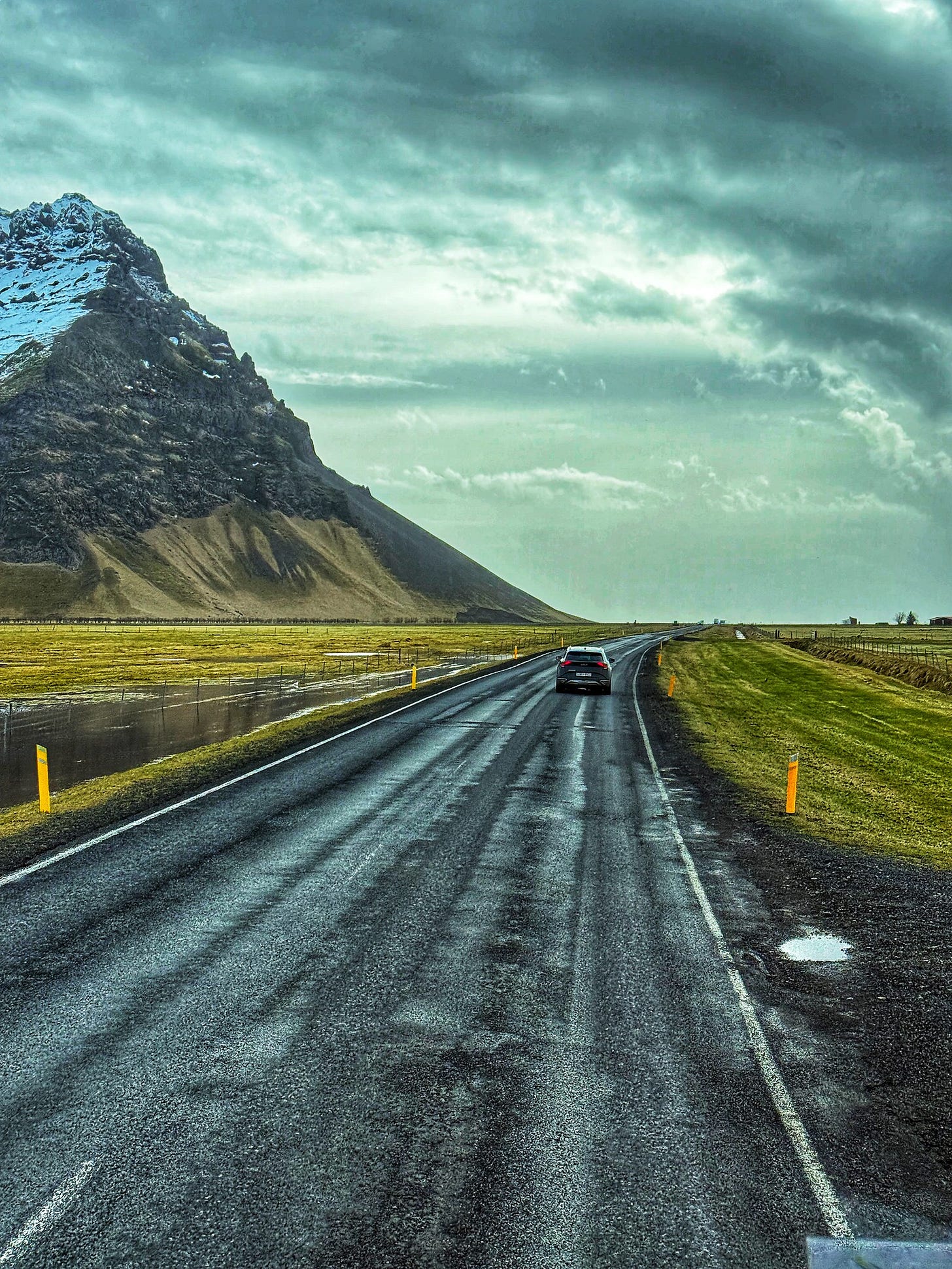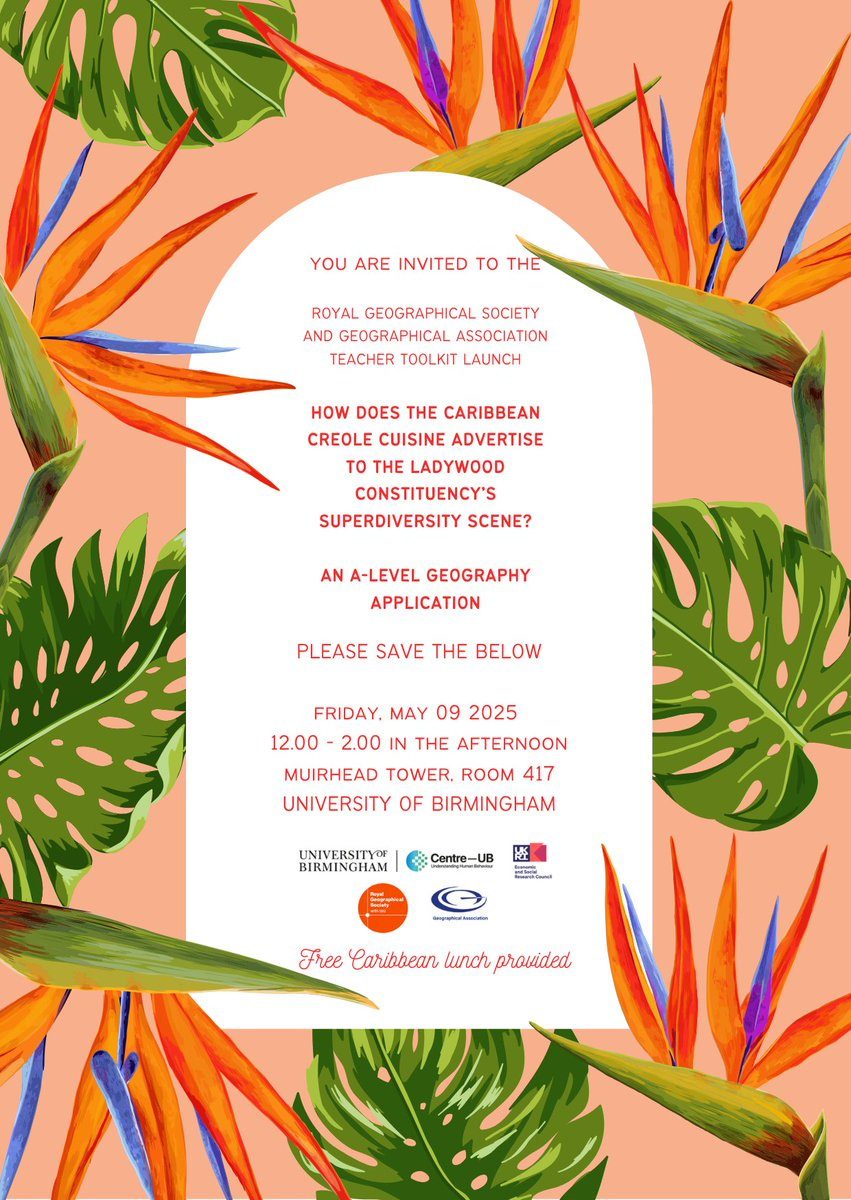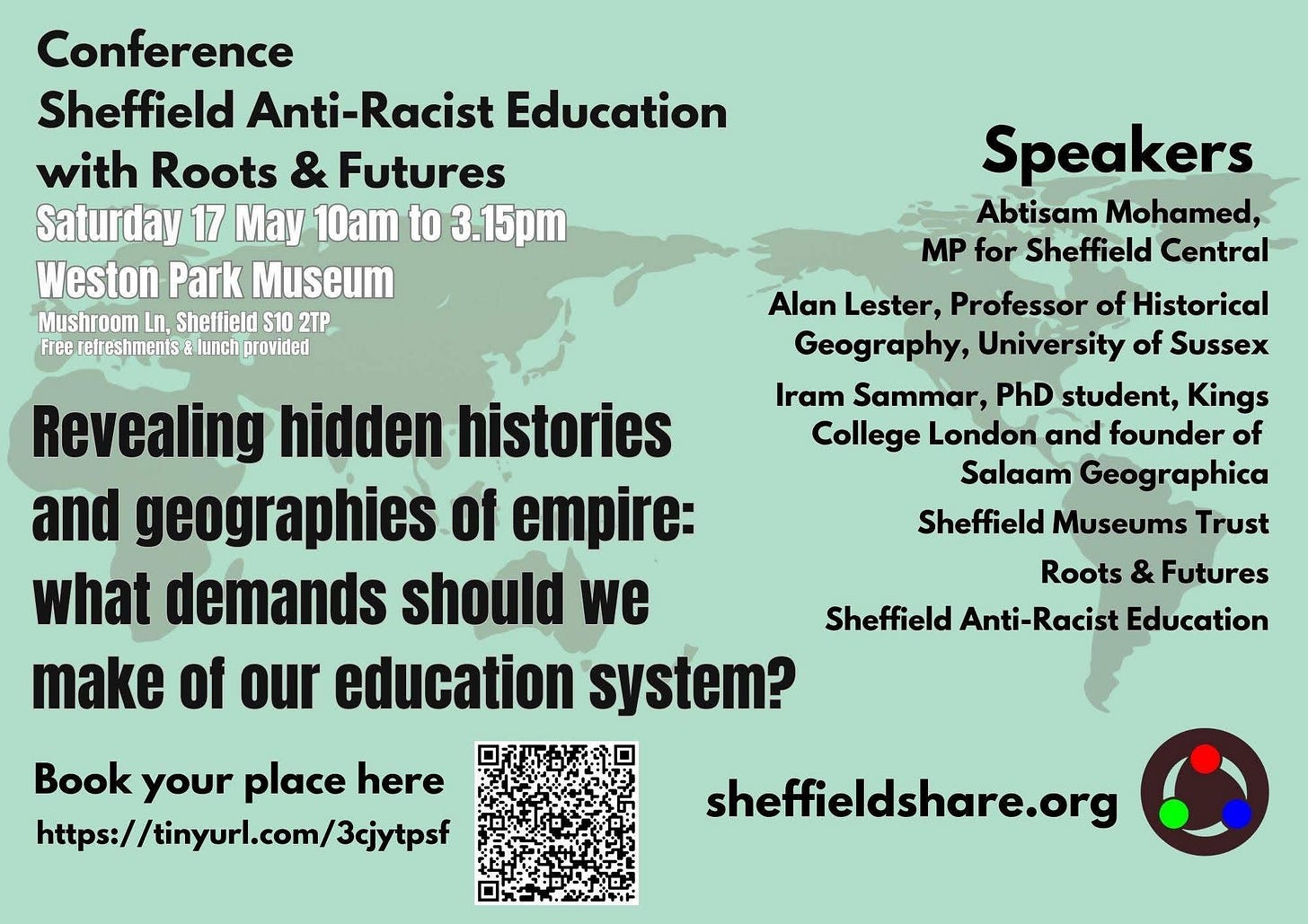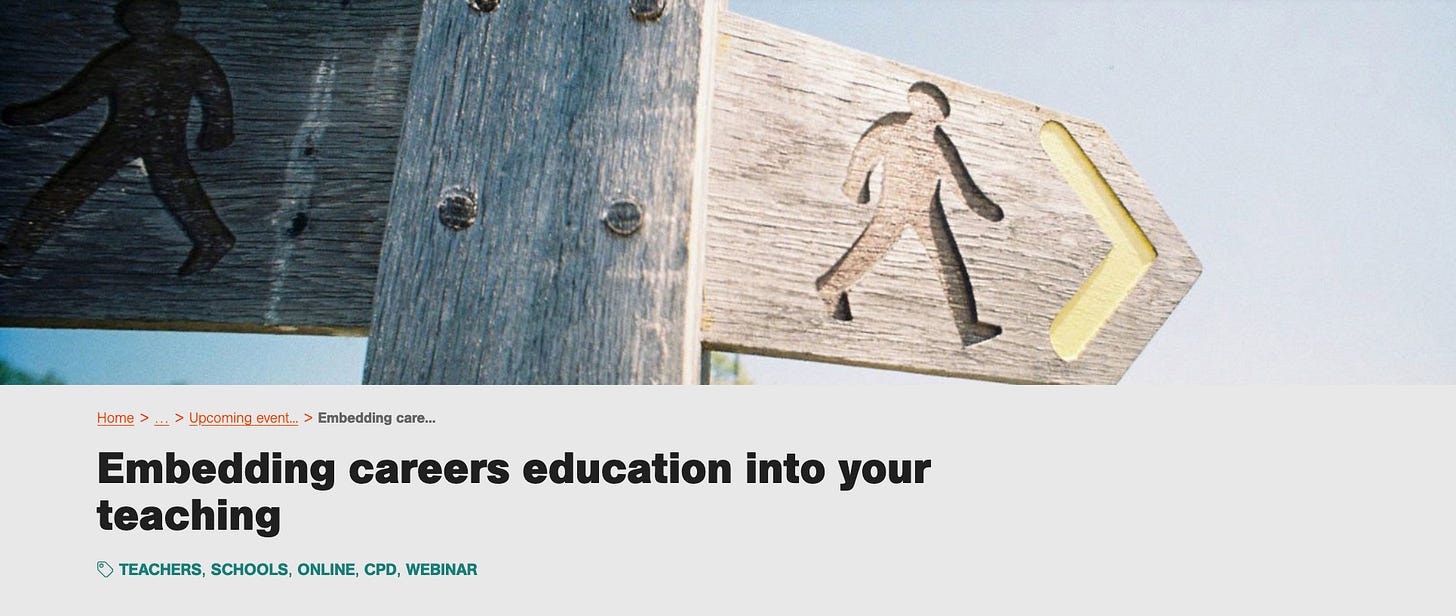Welcome to the thirteenth weekly newsletter providing a summary of key posts on the LivingGeography blog.
Each newsletter will usually include a number of sections:
a digest of posts from the LivingGeography blog (and other blogs)
any important geographical news
an update on any personal projects
details of books that I am reading, or cultural experiences
a couple of nice images taken this week
events that you might be interested in
This week’s Substack newsletter is being published from Iceland where I have been since Sunday working for Rayburn Tours accompanying a school. The weather has been very changeable. An album of photos from the trip is taking shape over on Flickr.
Rayburn Tours are celebrating their 60th birthday this year. I have enjoyed being connected with them for five years and I look forward to being connected for many more (if they’ll have me).
I’ve woken up to snow and am off to the capital via a lava tunnel… breakfast first… and this newsletter is being posted early.
Posts this week included
My Flickr account has passed a million views of my images, which is a nice milestone to pass after over 20 years of sharing my images. They are available to use under a CC license.
A new piece in The Conversation on the power of place names, with reference to Trump’s executive order renaming Denali to Mt. McKinley and the Gulf of Mexico to the Gulf of America. Naming places is linked with power and identity.
The presentation I used at an RGS Teachmeet on Embedding Careers in Geography last week has been shared on Scribd. The event was not recorded, but you can get the idea by visiting this blog post.
I ended with a mention for the GeoDem AI project, looking at the ethics of geography. We are keen to get feedback on the course that we have put together and it would be great if you could take a look at Module 5.
This has a series of sections - I worked on the unit called ‘Ethical AI in the Geo-curriculum’. At the end of each of the units there is a brief survey and it would be great if you could work through at least one unit
I’ve just finished the annual run through of our Fashion Revolution starter unit with Year 8, other than the final stages which is to participate in Fashion Revolution week itself which takes place in the first week back after Easter. We covered the fact that a lot of donated fashion (clothes dropped off at charity shops or in the clothes banks in supermarket car parks) can end up in unexpected places, such as West African beaches or Chilean deserts. A major dump of clothes was in the news. As I’m in Iceland, the link isn’t working properly but it references Fashion Revolution Brazil and Re Commerce Atacama who are repurposing some of the clothing dumped in the desert.
On their website, their purpose is described as follows:
To save the Atacama Desert by "selling" free clothes. Yes, you've read it right, that's our only purpose. As a legacy left by the fashion industry, more than 40 thousand tons of clothing are being discarded, every year, in the Chilean desert's sand. This phenomenon createad the largest fashion landfill in the world. Hard to believe, but many of these pieces of clothing are brand new. Instead of selling them for lower prices or even giving them away for those in need, the fashion industry prefers to dump them.
Bad for the environment. Good for you. Because now you can get new outfits by big brands for zero dollars. That's true, clothes are free. You just pay for shipping. We give you the clothes, you pay the cost of getting them out of the Atacama Desert. Don't worry, we clean and pack each piece before sending. Fair enough?
How can Fairness be measured?
Check out the work of the Fairness Foundation, who have developed the ‘Fair Necessities’… a pun on the bare necessities one imagines. I’ve been reading a lot around this theme for the project that I mention later in the newsletter.
They have created a podcast on another important inequality resource: the latest book by Danny Dorling called ‘Seven Children’. This is around 56 minutes long.
There’s also one on a book I shared in the previous Substack newsletter called Limitarianism. I haven’t listened to this one yet, but I shall be when I get the chance as the idea is of interest in the context of ultra high wealth individuals and the preparations some of them are making for future uncertainties, as covered by Bradley Garrett and others.
Fewer posts than usual because of my five day Iceland trip.
News
As mentioned before, I have been in Iceland. The news here was not good on the 2nd day of the trip with a tourist being killed by a rock that fell along the South coast near the Eyjafjöll mountains - close to the glacier. It struck their car and injured the passengers. Driving that section yesterday we passed the area, with flashing lights and warning signs. We started the day in the Lava Centre which has live displays showing seismic activity. While we were there, we noticed the red glow of an eruption, which had just started on the outskirts of Grindavik. The eruption was short lived, and was over by early afternoon. With over 1500 earthquakes in the last 12 hours, there is more to come for sure.
Projects
I’ve been doing some advance planning for my major writing job of the Summer term (and holiday). This will involve over 30 sessions: resources and activities to connect with a range of themes and concepts. I’ve drafted the lesson enquiry questions and started to draft ideas for the key areas of investigation, reading, web links and questions for students. Looking forward to getting stuck in when the final author brief and spec are finalised. I’m also re-energised to get more Icelandic content in there.
Books
I’ve been travelling light-ish but I bought a copy of ‘The Shortest History of Migration’ by Ian Godin, from Heathrow airport - who is a prolific author of popular science and similar books - his website lists more of his books on a broad theme of economics and related disciplines. It starts with his own personal family story and references the central tenet of Gaia Vince’s excellent ‘Nomad Century’ book: that we are all nomads and that migration is a solution to our problems - not a problem if it is managed properly which we are manifestly failing to do. It’s readable and has some useful insights and I shall refer to it in some future writing.
Images
A few of the many images I took this week (and with lots more to come next week too).
The Oaxara (Axe) River as it flows out of the Drowning Pool and down onto the meadows at Thingvellir. The first sunshine of the trip.
The view from the best seat of the bus along Route 1 on the South Coast.
Events
Don’t forget the Festival of Geography down at the RGS-IBG in June. I shall be ending the day by presenting the final session exploring careers options. I learned a lot from last week’s RGS-IBG Teachmeet.
This is an interesting event taking place in Birmingham in May. It links with the ‘Changing Places’ topic… and there is such a thing as a free lunch! And a Caribbean one at that.
How does the Caribbean Creole cuisine advertise to the Ladywood constituency's Superdiversity Scene? - an A-Level Geography Teacher Tool Kit Launch!
(with a free Caribbean lunch and networking session for those who attend!)
May 9th, 12.00pm - 2.00pm at Room 417, Muirhead Tower, University of Birmingham
Catered for A-Level Geography teachers and geography educators.
Get ready to discover a range of resources and tools designed to enhance your teaching experience.
The toolkit which was created in partnership with the Geographical Association and Royal Geographical Society is based on the research of Dr Charlene Rose who asked how do Caribbean restaurants and takeaways advertise to the superdiverse city of Birmingham, more specifically the Ladywood constituency. The research has then been applied to the A-level Geography ‘Changing place; changing places’ core theme to create the toolkit.
Whether you're a seasoned educator or just starting out, this event is perfect for anyone looking to add some spice to their geography lessons. Network with fellow teachers, exchange ideas, and hear about some of the research happening in human geography.
An event for students at the RGS-IBG in June.
Thanks to Jon Wolton for this tipoff to a useful event for anyone in or near Sheffield. I love Weston Park Museum and was a regular visitor back in the day.
This event is taking place in Norwich. Unfortunately I won’t be able to attend as I will be in Paris.
Our urban commons are a precious resource with enormous significance for promoting biodiversity, and for health and wellbeing in an urban context. Chris will explore the different legal and cultural concepts of an urban common, illustrated by examples from research that includes Mousehold Heath in Norwich.
Chris argues we should instead identify the ecosystem services that urban commons provide – to better enable us to protect and promote them as multifaceted sites for nature conservation, recreation and landscape protection for the future.
Finally, here’s two that actually involve me.
The first one is in April and is part of GeoNight. A link to join the online session will be posted on the day as I will be in Iceland until then. I think this may be the only UK based event on that night - previously I was one of only two events and one of the key organisers of the event joined my session which was really pleasing.
The second one will take place online at 5pm on the 18th of September - so it’s some way off yet. You can book a place here (it’s free)
Details:
There has never been a better or more important time to embed geographical careers education into your curriculum. Studying geography provides students with knowledge and transferable skills that will reward them personally and advance them professionally.
In this free online CPD session, Alan Parkinson, author of Why Study Geography? and the Society's Vice President: Education, will take teachers through the ways in which geographical career options and pathways can be embedded seamlessly into the curriculum in fun, interesting and useful ways.
Alan will cover topics such as why embedding careers education into your teaching is so important and how this benefits students, as well as providing an overview of the key messages you could be using to ‘sell' geography's vocational strengths to students and parents/carers.
He will also provide a brief overview of the types of jobs that geographers do and where to find information and resources to support your careers work.
The session will be full of ideas, examples of good practice and inspiration to help you think creatively about showcasing the skills and opportunities students gain when they study geography.
As always, let me know of anything you’d like me to feature: events, jobs… etc. I’ve shared a few recent job options over on my Blue Sky account, which is @GeoBlogs (like my old deactivated Twitter account, but with 8000 fewer followers at the moment. Next week’s newsletter will be posted from Paris. Have a good week if you’re already on holiday and for those who aren’t yet - you’re nearly there!

















